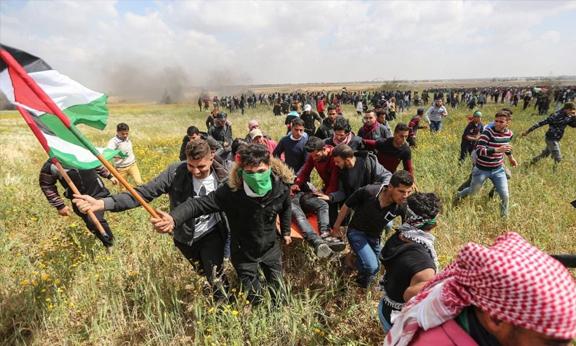Across the occupied territories, Palestinians are preparing for more protests demanding recognition of refugees’ right to return to their homeland and to the villages erased and ethnically cleansed by Israel in 1948.
After an orgy of violence by Israeli occupation forces in Gaza, which killed 18 and injured 1,700, solidarity protests around the world have backed calls for an investigation and demanded that Israel be held accountable for its crimes.
Israel’s violence, described by charity Medical Aid for Palestinians as “the bloodiest day in Gaza since Israel’s 2014 offensive”, has been compared with apartheid South Africa’s Sharpeville massacre, the 1976 Soweto uprising and Bloody Sunday in Ireland, when, in 1972, British occupation forces killed 28 unarmed civilians in Derry.
However, such massacres have for decades been commonplace in Palestine.
On 30 March, 30,000 Palestinians assembled close to the heavily fortified Gaza-Israel border. Their protest marked the beginning of six weeks of popular mobilisation, which will culminate on the 70th anniversary of the Nakba (“catastrophe”), when Israel launched its systematic genocide of the Palestinian people.
Palestinians chose Land Day to begin their protest. The day commemorates the killing of six unarmed Palestinian youth by Israeli military forces on 30 March 1976, during mass peaceful protests against Israel’s large-scale confiscation of Palestinian land to create exclusively Jewish colonial settlements. Land Day is Palestine’s Sharpeville: it is commemorated every year to demonstrate the arbitrary nature of Israeli colonial settler violence.
Read the article by Nick Everett in The Red Flag.

